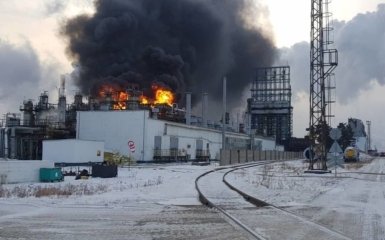Russia began to actively purchase EW systems for refineries against Ukrainian drone attacks.
How the Kremlin is trying to strengthen the protection of oil refineries against Ukrainian drone attacks
As ATESH notes, for the refinery they are purchasing electronic warfare systems against long-range Ukrainian drones.
The main choice fell on mobile complexes of the Shpak type. These EW systems are actively used by the Russian army in the war against Ukraine.
As is well known, EW systems are unable to intercept all types of drones. There is information that some factories already had such systems at the time of the attacks, but they did not help them. It is assumed that Ukrainian drones use advanced technologies, which makes them more difficult to detect and intercept, — say the partisans.
In addition to the purchase of new EW systems, enterprises are strengthening tanks with sandbags. Camouflage nets are also used, and lighting is turned off at night.
What is known about Ukraine's attacks on Russian refineries
What is important to understand is that at least 14 attacks on enemy refineries have been carried out over the past three weeks:
March 17 — oil plant in Sloviansk-on-Kuban,
March 16 — Syzransky and Novokuybyshevsk refineries in the Samara region,
March 15 — Belgorod Refinery,
March 14 — Refinery in Ryazan,
March 13 — Refinery in Leningrad Oblast and Oil Products Plant in Novoshakhtinsk, Rostov Oblast,
March 12 — Lukoil oil depot in Kstov, Nizhny Novgorod.

According to experts' estimates, about 14% of Russia's oil refining facilities were stopped by drone attacks. Russia this month was forced to increase its imports of gasoline from neighboring Belarus to deal with possible fuel shortages.
The other day, the Financial Times wrote that the US allegedly urged Ukraine to carry out these attacks because they could raise global oil prices and provoke retaliation.
Deputy Prime Minister Olga Stefanishyna noted that the corresponding targets on the territory of the Russian Federation are absolutely legal from a military point of view. In addition, attacks on infrastructure of this type meet NATO standards.
The commander of US forces in Europe in 2014-2017, Ben Hodges, emphasizes that Ukraine should ignore advice to stop attacks on Russian energy infrastructure.
More on the topic
- Category
- Events
- Publication date
- Додати до обраного


